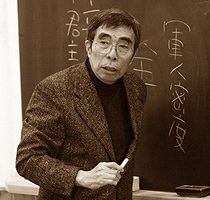 W
W1Q84 is a dystopian novel written by Japanese writer Haruki Murakami, first published in three volumes in Japan in 2009–10. It covers a fictionalized year of 1984 in parallel with a "real" one. The novel is a story of how a woman named Aomame begins to notice strange changes occurring in the world. She is quickly caught up in a plot involving Sakigake, a religious cult, and her childhood love, Tengo, and embarks on a journey to discover what is "real". Its first printing sold out on the day it was released and sales reached a million within a month. The English-language edition of all three volumes, with the first two volumes translated by Jay Rubin and the third by Philip Gabriel, was released in North America and the United Kingdom on October 25, 2011. An excerpt from the novel, "Town of Cats", appeared in the September 5, 2011 issue of The New Yorker magazine. The first chapter of 1Q84 had also been read as an excerpt in the Selected Shorts series at Symphony Space in New York.
 W
WDance Dance Dance is the sixth novel by Japanese writer Haruki Murakami. First published in 1988, it was translated into English by Alfred Birnbaum in 1994. The book is a sequel to Murakami's novel A Wild Sheep Chase. In 2001, Murakami said that writing Dance Dance Dance had been a healing act after his unexpected fame following the publication of Norwegian Wood and that, because of this, he had enjoyed writing Dance more than any other book.
 W
WKafka on the Shore is a 2002 novel by Japanese author Haruki Murakami. Its 2005 English translation was among "The 10 Best Books of 2005" from The New York Times and received the World Fantasy Award for 2006.
 W
WInoue Hisashi was a leading Japanese playwright and writer of comic fiction. From 1961 to 1986, he used the pen name of Uchiyama Hisashi.
 W
WLizard (とかげ) is a short story collection by Banana Yoshimoto, written in 1993 and translated into English in 1995 by Ann Sherif. It is a collection of six short stories on love and the healing power of time.
 W
WA Wild Sheep Chase is the third novel by Japanese author Haruki Murakami. First published in Japan in 1982, it was translated into English in 1989. It is an independent sequel to Pinball, 1973, and the third book in the so-called "Trilogy of the Rat". It won the 1982 Noma Literary Newcomer's Prize.
 W
WThe Wind-Up Bird Chronicle is a novel published in 1994–1995 by Japanese author Haruki Murakami. The American translation and its British adaptation, dubbed the "only official translations" (English) are by Jay Rubin and were first published in 1997. For this novel, Murakami received the Yomiuri Literary Award, which was awarded to him by one of his harshest former critics, Kenzaburō Ōe.